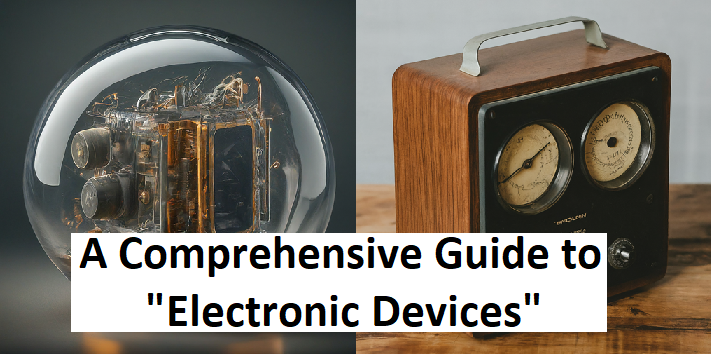A Comprehensive Guide to Electronic Devices – Discover the world of electronic devices in this comprehensive guide. Learn about their components, types, applications, and the future of technology. From smartphones to industrial automation, explore the fascinating realm of electronics.

What are Electronic Devices?
Electronic devices are a broad category of products that utilize electrical components to perform specific functions. They range from simple gadgets like calculators to complex systems like computers and smartphones. These devices have become an integral part of our daily lives, powering everything from entertainment and communication to transportation and healthcare.
Key Components of Electronic Devices
- Semiconductors: These are the fundamental building blocks of most electronic devices. They control the flow of electrical current, enabling devices to perform various functions. Common semiconductors include transistors, diodes, and integrated circuits.
- Passive Components: These components do not require an external power source to function. They include resistors, capacitors, and inductors, which are used to control the flow of current and store electrical energy.
- Integrated Circuits (ICs): ICs are tiny chips that contain millions of transistors and other components interconnected to perform specific tasks. They are the heart of modern electronic devices.
- Power Sources: Batteries, power adapters, and solar panels are common power sources for electronic devices. They provide the electrical energy needed for operation.
Types of Electronic Devices
- Consumer Electronics: These devices are designed for personal use and entertainment. Examples include televisions, smartphones, laptops, and gaming consoles.
- Industrial Electronics: These devices are used in industrial settings to control machinery, automate processes, and monitor production. Examples include PLCs (Programmable Logic Controllers), sensors, and robots.
- Medical Electronics: These devices are used in healthcare to diagnose, treat, and monitor patients. Examples include electrocardiograms (ECGs), MRI machines, and hearing aids.
- Automotive Electronics: These devices are used in vehicles to control various functions, such as engine management, braking, and entertainment systems.
Applications of Electronic Devices
Electronic devices have revolutionized various industries and aspects of our lives. Some key applications include:
- Communication: Smartphones, computers, and tablets have transformed the way we communicate with each other.
- Entertainment: Televisions, gaming consoles, and streaming devices provide endless entertainment options.
- Education: Computers and tablets are used for online learning, research, and educational software.
- Healthcare: Medical devices assist in diagnosing diseases, performing surgeries, and monitoring patient health.
- Transportation: Electronic controls are used in vehicles to improve fuel efficiency, safety, and performance.
- Industry: Industrial electronics automate processes, improve efficiency, and enhance quality control.
The Future of Electronic Devices
As technology continues to advance, we can expect to see even more innovative and sophisticated electronic devices. Emerging trends include:
- Internet of Things (IoT): Connecting everyday objects to the internet, enabling remote control and data collection.
- Artificial Intelligence (AI): Integrating AI into devices to make them more intelligent and responsive.
- Wearable Technology: Devices that can be worn on the body, such as smartwatches and fitness trackers.
- Quantum Computing: Harnessing the power of quantum mechanics to solve complex problems that are beyond the capabilities of classical computers.
A Comprehensive Guide to Electronic Devices – Electronic devices have become an indispensable part of our modern world. Their versatility, functionality, and continuous evolution have transformed the way we live, work, and interact with each other. As technology progresses, we can anticipate even more exciting and groundbreaking developments in the field of electronics.
Home | Join us on Facebook, Twitter, YouTube, Instagram, Quora, Reddit, LinkedIn, Pintereset, Blogger.